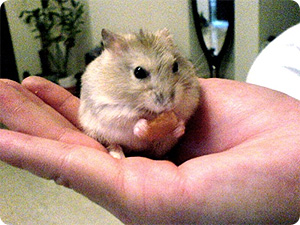HAMSTER Pet Care

General Care Information
- Get the right equipment – cage, bedding, nesting materials, toys, water bottle, foood
- Provide a good variety of foods – in addition to hamster mix and hamster treats, provide fresh fruit and vegetables
- Clean their cages weekly
- Get regular checkups with the veterinarian
- Handle your hamster with care – wash your hands before and after handling your hamster
- Handling your Hamster
Hamsters that are handled regularly, beginning when they are young, become docile friendly creatures. But beware, if a hamster feels he is being handled too rough, or if he is disturbed when resting or sleeping they can become aggressive. If the hamster becomes aggressive you can grab the hamster by the skin on the back of its neck to move it back to its cage. The next time you pick up your hamster you may want to try using gloves.
To pick up hamsters, follow these general guidelines:
Cup your hands around the hamster and press your palms against it.
To pick up on the back of the neck, cup your hand under the hamster’s rump and use your thumb and index and middle fingers to grab the loose skin on the neck.
HAMSTER Feeding Information
Hamsters will be most healthy if provided a regular diet of commercially available rodent pellets, supplemented with occasional fruits and vegetables. From this diet, Hamsters will get the necessary levels of proteins, carbohydrates, fats, vitamins and minerals. Many pet stores sell different types of hamster treats that appeal to your desire to make your pet happy, but do not provide sufficient nutrition to be used as a regular staple in hamster’s diets. Hamsters should never be fed sweets or milk as they will store the sweets in their mouth promoting tooth decay.
Occasional fruits and vegetables help regulate the hamsters’s digestive system and helps prevent intestinal problems. Fresh fruits and vegetables should NOT replace the nutritionally dense pellets, as these fresh dietary supplements are mostly water and do not contain the essential vitamins, minerals and other nutrients that the pellets provide.
If hamsters are provided a regular diet of pellets, fresh water, and occasional fruits and vegetables, additional vitamin supplements do not need to be part of their feeding routine.
Hamsters should have water made available to them at all times, especially during the hotter seasons of the year. A hanging drops-style water dispenser is a great solution for keeping water from spilling and keeping it free of contaminants. The water dispenser should be refilled with fresh water every two days and should be cleaned with a disinfectant soap and rinsed thoroughly each time it is filled.
HAMSTER Grooming
Hamsters are inherently clean and tidy animals and do not need to be groomed by the pet owner. They are healthy and disease free throughout their lives because of how clean they keep themselves.
HAMSTER Housing
Hamster cages should be spacious and secure. While male hamsters can live comfortable in a medium sized cage, breeding females require a larger area to raise her young. A well equipped cage would have an exercise wheel, nesting boxes and tunnels for the hamsters to climb through. A deep pile of wood shavings will give the hamsters a comfortable place to nest and hide. Fiberglass cages are generally the best as it allows the pet owner to observe their pets, but also serves as a secure area for hamsters that are more apt to escape than stay in their cage. Hamsters will chew through materials constructed of plastic, wood, and soft metals.
The hamster housing should be kept in an environment that is cool and shaded. Hamsters prefer to live in 40 – 70% humidity at 65 – 79 degrees F.
Hamster cages should be cleaned weekly by changing out the wood shaving bedding and by washing the cage with hot water and a non-toxic disinfectant. Water and food dispensers should be cleaned regularly as well – about once a week.
HAMSTER Exercising
Hamsters require plenty of regular exercise. Most hamsters are completely satisfied with an exercise wheel, but mazes and toys are also good ways keep your hamster in healthy shape. Whatever activity or area you provide your hamster, make sure your hamster cannot escape.
The best hamster wheels are solid surface wheels that attach to the side of the cage. Wire wheels are not recommended as it may cause injuries.
| |
Other Categories
HAMSTER Pet Care
HAMSTER Health Information
HAMSTER Diseases
HAMSTER Pups
HAMSTER Breeds
HAMSTER Products
Main Categories
DOGS
CATS
HORSES
BIRDS
RABBITS
HAMSTERS
MICE AND RATS
GUINEA PIGS
FISH
|

